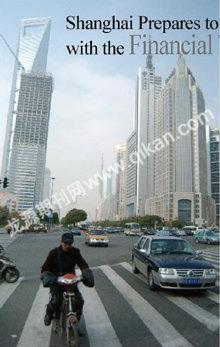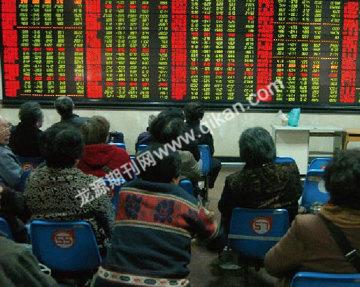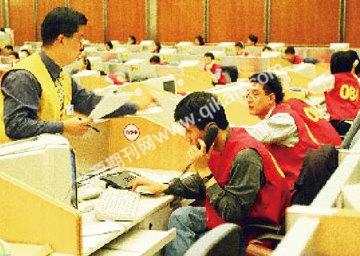Shanghai Prepares to Tango with the Financial Tornado
By staff reporter LIU QIONG

THERE is an old Chinese saying, “A mans greatest woe is entering the wrong trade; a womans is marrying the wrong man.” In that case, in an era where both men and women, married and single, need to work, women must be cautious on both counts.
Li Sha for one thinks she may have made a bad career decision. Having long envied the large salaries of friends working in finance, Li resigned from her government post in early 2008 and took a job at Industrial Securities. Although Chinas stock market was already on the slide, Li was confident of an imminent reversal. Since then, the US financial crisis has erupted, spread and gone global.
Chinese Finance Holds Its Own
Talking to researcher Guo Linkai, a former classmate and colleague at Industrial Securities, revived Lis spirits. “The financial disaster triggered by the US sub-prime crisis has not directly affected Chinas financial sector,” he assured her. “Chinas securities companies have low overseas investment, and the factors that wrecked foreign investment banks do not apply to China.”
The Industrial Securities headquarters is in Lujiazui Finance and Trade Zone in Shanghais dynamic Pudong New Area. It is a conflux of international stock exchanges and banks that include Bank of China, HSBC and Citibank. “The crisis has had limited impact on commercial banks, whose main business is traditional savings and lending,” Guo said. His opinion is corroborated by the Industrial Banks 2008 third quarter report, which revealed that at September 30 last year its revenue had risen 39.32 percent and its net profits 56.49 percent compared with the same period in 2007.

Another reason why Chinas commercial banks remain stable is their low percentage of foreign currency assets, according to Wang Songqi, vice-president of the Institute of Finance and Banking of the Chinese Academy of Social Sciences. These banks staple income is generated by the disparity between deposit and loan interest rates which remained high in 2008. Commercial bank net profits growth, on average, exceeded 60 percent during the first half of the year.
As regards the insurance industry, domestic insurers have few overseas investments, and therefore are little affected by the global crisis. As the market share of a few dozen foreign-funded insurance companies on the Chinese market is less than 10 percent, any tremors they might feel from their parent companies abroad will not overtly affect Chinas insurance market.
“Chinas financial sector has sustained no great losses as a result of the US crisis, and the countrys financial system remains stable. It merits our confidence,” said Ding Zhijie, vice-president of the School of Finance and Banking in the University of International Business and Economics.
Reforms in Chinas financial sector, such as share-holdings in state-owned commercial banks and improved management of medium-sized and small financial institutions, have advanced in recent years. They act as the sectors risk buffer.

The Banking Supervisory Authority has been on the alert for market risks over the past two years, which is why it raised the down payment percentage on home mortgage loans in good time. And as Chinas commercial banks are traditionally punctilious about lending, they avoid the perils of US sub-prime credit. The Industrial and Commercial Bank of China, the countrys largest commercial bank, experienced a paltry 1.84 percent in loan defaults by developers and 0.74 percent by home buyers, according to statistics.
The financial sector in Shanghai, seat of 850 financial institutions, including 375 foreign-funded and joint ventures with total assets exceeding RMB 5 trillion, maintains an optimistic outlook. The business volume on the domestic financial market from January to November 2008 hit RMB 144.2 trillion, a 26.5 percent rise, according to the municipal governments financial service office. And during the first three quarters of 2008 the citys banking industry made profits of RMB 62.05 billion – 1.1 times that of the whole year of 2007.
Still No Safe Haven
These cheering analyses, however, do not imply that China is immune to the crisis presently ravaging the global economy. It is indirectly afflicted. The plunging global stock market and fluctuations in the RMB-USD exchange rate represent serious threats, particularly to Chinas entity economy.
“A slowing world economy is taking its toll on Chinas exports, and consequently impairs the whole national economy, including the financial sector,” Li Sha said. Given Chinas heavy dependence on exports for its rapid economic growth over the past 30 years, the nation must now brace itself as major importers Europe and the US head towards full recession.

The 70 percent deflation that Chinas stock market suffered in 2008 was among the worst worldwide. Li Sha and her colleagues have low expectations for their company year-end bonus.
But this is a prudent attitude at a time when the securities industry is widely predicted to lose 13 percent in revenue and 16 percent in net profits in 2009. These figures already dropped a respective 55 percent and 63 percent in 2008. The rate of return on common stockholders equity (ROE) is also expected to dive deeper from 13 percent in 2008 to 10 percent. The securities sector has finally met its winter of discontent after a balmy spring in 2006 and a burgeoning summer in 2007, when revenues and profits hit record highs.
But every cloud has a silver lining. Fang Xinghai of the Shanghai Government Financial Service Office has pinpointed the world financial center shift of focus towards Asia since the US sub-prime crisis. The concerted failure of international investment banks thus clears the way for domestic securities companies to advance on the world market, where Chinese players can compensate for their lack of managerial expertise and experience by purchasing shares in their international counterparts.
The regiment of professionals dismissed from Wall Street is also a windfall for China. In December of 2008, the Shanghai municipal government sent a delegation of representatives of two dozen banks, insurance and securities companies to the UK and the US to headhunt senior managers in various financial fields. There were reports of an overwhelming volume of applicants at each stop. The delegation returned bearing a 150-kg load of resumes.
Schools in for White Collar Workers
An influx of international brains might benefit Chinas financial industry, but does not bode well for those already working in it.
Zhang Ruijun, a friend of Li Sha who receives his doctorate in economics from the renowned Renmin University later this year, recently wrote the baleful legend, “born at a bad time, wronged for life,” on MSN. His chagrin is understandable. Workers with BA or Masters degrees in the securities sector in 2006 and 2007 were earning six-to-seven digit annual salaries. Zhang hence had good reason to believe that someone like himself with a doctorate could clean up. But his ambitions were shattered a few months before he graduated by the recession that swept across the world leaving high unemployment in its wake.
A news item about prospective job cuts at China International Capital Co., Ltd. (CICC) in mid-October 2008 sparked panic in Chinas securities circles as it raised the prospect of a chain reaction throughout the industry. CICC quickly released the disclaimer, “Although the market is weak, it is still important to maintain a talent reserve. We wont let go of people with abilities.”
But assurances from a single employer, no matter how big, cannot rescue the generally flagging labor market. In the second half of 2008, the job advertising website 51job.com recorded a 12 percent drop in posts offered by financial companies, and a 6 percent fall in openings at real estate corporations.
Employees amid this economic downturn should hold fast to their bird in hand rather than look for new jobs, is the advice of Prof. Wang Fanghua, president of Antai College of Economics and Management, Shanghai Jiao Tong University. It might be worth going back to school to learn new skills and knowledge. “Our university has seen a surge in applicants this year. This confirms the generally believed rule that at times of thriving economy people focus on making money, and when things are quiet on the economic front people seek refuge in higher education, such as an MBA course.”

